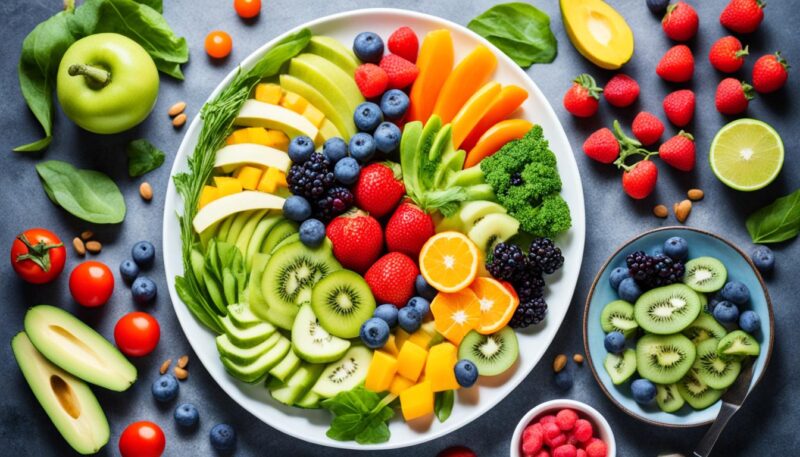Living with PCOS can be really tough. It brings hormonal imbalances, unpredictable periods, and more. One big issue is bloating. Picture your stomach getting bigger and feeling very full. It can cause discomfort and frustration. I get how hard it can be.
My name is Lisa, and dealing with PCOS is something I’ve faced for years. Bloating was always tough for me because it affects so much, like, confidence, enjoying food, and my social life. But, with the right changes in diet and lifestyle, you can lower bloating.
I want to share some top PCOS diet tips for bloating relief. These are things I’ve tried and found useful. We’ll talk about easy diet changes and how to find foods that make you bloated. Let’s walk through ways to ease bloating and feel better overall.
So, if you’re over feeling bloated and ready to manage your PCOS, join me. We’ll see how a good PCOS diet can beat bloating for good.
Key Takeaways:
- PCOS can cause bloating, which can be a source of discomfort and frustration.
- A PCOS-friendly diet can help alleviate bloating symptoms and improve overall well-being.
- Dietary changes, such as avoiding trigger foods and improving gut health, play a significant role in managing PCOS bloating.
- Lifestyle modifications, including regular exercise, adequate sleep, and stress management, can also contribute to bloating relief.
- Working closely with a healthcare provider is essential in developing a personalized plan to manage PCOS bloating effectively.
Understanding PCOS and Bloating
PCOS and bloating often go hand in hand, linked by inflammation and stress. Bloating is a key issue for people with PCOS. It shows up as belly pain, feeling full quickly, and a swollen belly. The link between PCOS and bloating is complex.
PCOS can make bloating worse in a few ways. Changes in hormones, like extra estrogen and insulin, can mess with digestion. This can lead to more gas. A not-so-healthy gut can also cause bloating. This might mean too many bad bacteria or slow gut movement. Even some PCOS medicines, like metformin or birth control, could make you bloat.
But, not everyone with PCOS gets bloated. And for those who do, how bad it is can change. It might happen now and then or stay a constant problem. This depends on your hormones, what you eat, and how you live.
Symptoms of PCOS and Bloating
Along with bloating, PCOS brings other signs. You might have periods that aren’t regular, too much acne or hair, and cysts on the ovaries. These symptoms vary a lot in how they show up and how severe they are. Talking to a doctor is key for figuring out what’s going on and how to treat it.
The Role of Diet in PCOS Bloating
Diet is key in controlling PCOS bloating. Some foods might hurt your gut, make you gassy, and bloated. Other foods can help reduce bloating and keep your gut healthy. Through smart food choices, those with PCOS can lessen these symptoms.
Foods that Cause PCOS Bloating
Dairy, gluten, and sugary foods often trigger bloating in PCOS. Milk, cheese, and yogurt may not digest well for some, causing bloating. Gluten foods, like bread and pasta, can do this too. Sugary drinks and sweets disrupt gut balance, causing bloating through inflammation.
Foods to Reduce PCOS Bloating
Fiber, found in fruits, vegetables, and grains, aids digestive health, reducing bloating. Probiotic-rich foods, like yogurt, create a healthy gut environment. Anti-inflammatory foods – fatty fish, greens, and berries – fight bloating by calming body inflammation.

Each person with PCOS reacts differently to foods. Track what you eat to see how foods affect your body. This can help you find which foods to avoid.
Gut Health and PCOS Bloating
Good gut health is vital for handling PCOS bloating. A balanced diet, high in fiber, probiotics, and anti-inflammatory foods, is key. Processed food avoidance, moderate fat, and drinking enough also support gut health.
Studies show the gut affects PCOS and bloating. The International Journal of Molecular Sciences underlined how gut bacteria links to PCOS symptoms, inc bloating. Eating right and living healthy can improve gut health, lessening bloating and feeling better.
PCOS Medications and Bloating
Managing PCOS sometimes involves taking medications. They target certain symptoms and hormone imbalances. But, it’s good to know that some of these drugs can make you feel bloated.
Metformin is one key drug for PCOS. It helps keep your insulin in check. Yet, it might cause stomach upset and bloating. This is more likely when you start taking it or when your dose goes up.
Birth control pills are used a lot for PCOS too. They can make some people feel bloated. This happens because they mess with how your body holds water and digests food.
But, not everyone gets bloated from PCOS drugs. If it happens to you, talk to your doctor. They can help decide if you need a change in your meds. Or they might have other choices for you.
Your doctor might suggest things to ease the bloating. They could start you on a smaller drug dose. Then slowly raise it. Taking the meds with food can also help cut down on tummy issues.
Staying in touch with your doctor is really important. It helps in dealing with PCOS and issues like bloating. By working together, you can improve your treatment and lessen side effects.
Lifestyle Changes for PCOS Bloating Relief
Managing PCOS bloating involves making simple lifestyle tweaks. These changes can ease bloating and boost your digestive health.
Adding regular exercise to your routine fights PCOS bloating. Walking, cycling, and yoga are great. They speed up how well your gut works, balancing bacteria. Exercise cuts bloating and lifts your spirits.
Getting enough sleep is key, too. Poor sleep messes up your hormones, leading to bloating and constipation. Stick to a steady sleep schedule and a calming bedtime routine for better sleep and gut health.
Don’t forget about stress management. Meditation and mindfulness lower PCOS bloating. Stress hurts your gut and causes bloating. Relax often, do deep breathing, and choose calming activities to fight stress bloating.

Lifestyle changes take time to show results. But, sticking to them and being patient is vital. They are your long-term strategy against PCOS bloating.
For more on how lifestyle changes help PCOS bloating, read this study. Experts share insights there.
Identifying Food Triggers for PCOS Bloating
Understanding your food triggers is crucial for managing PCOS bloating. Start by writing down what you eat every day. Cut out foods known to cause bloating, like gluten and dairy, to see what affects you.
Keeping a food diary helps link what you eat to how you feel. It points out patterns or foods that might be causing bloating. An elimination diet can be very helpful for this issue. It involves removing suspected foods one by one then checking how you feel without them.
Gluten and dairy are often found to cause PCOS bloating. They may inflame your gut and lead to discomfort. To know if they’re behind your bloating, stop eating them for a while. Then, reintroduce one at a time to watch for any symptoms.
Trying a low FODMAP diet could help too. This diet cuts out foods rich in fermentable carbs. These foods often cause bloating, especially for those with IBS. Avoiding certain fruits, veggies, and grains can reduce bloating.
It’s important to remember that reactions to food differ from person to person. What causes bloating in one might not in another. Paying close attention to your body and your diet, alongside support from healthcare professionals, can create a plan that’s best for you.

For more info on how diet affects PCOS bloating, check out this study.
Probiotics and PCOS Bloating
Your gut health is key in fighting PCOS bloating. Adding probiotics to your diet can make a big difference. Probiotics are live bacteria that work to bring your gut’s balance back. They help break down food and ease bloating.
Foods like yogurt, kombucha, and sauerkraut offer these good bacteria. These items are tasty and give your gut what it needs. By eating them, you’re helping reduce bloating from PCOS.
Not into these foods? Not a problem. You can take a probiotic supplement instead. These pills are packed with helpful bacteria. But, always talk to a doctor or dietitian first. They can tell you if it’s right for you.

However, probiotics alone won’t fix your PCOS bloating. You should also eat well, stay active, and manage stress. This combo is the best way to support your gut and cut bloating.
Other Strategies for PCOS Bloating Relief
Changing your diet helps with PCOS bloating, but other methods can also work. These strategies can fit into your daily routine, making it easier to reduce bloating.
Reducing Sugar Intake
Too much sugar can make bloating worse. Try to cut down on sweets, sodas, and processed foods. Instead, eat more whole foods and use natural sweeteners only a little.

Fiber-Rich Diet
Eating more fiber is good for your stomach. It can also keep you from getting constipated, which helps with bloating. Aim for 25 grams of fiber each day by eating lots of fruits, veggies, grains, and legumes.
Thyroid Health
Your thyroid can affect your metabolism and bloating. It’s key for those with PCOS to keep an eye on it. Make sure your thyroid is working well by talking to your doctor. They can check and fix any problems with your levels.
Maintaining a Healthy Lifestyle
Exercise and good sleep can also cut back on bloating. Healthy activities like walking, swimming, or yoga can improve your digestion. Try to get 7-8 hours of sleep each night.
Managing stress is important too. Meditation or deep breathing can help lower stress and reduce bloating. These lifestyle changes, along with diet, can make a big difference in managing PCOS bloating. Each person is different, so listen to your body to see what helps you most.
Conclusion
To manage PCOS bloating, it’s key to look at diet and lifestyle together. Knowing which foods trigger bloating, like gluten and dairy, can help. By avoiding these, people can lessen bloating. Adding probiotics and fiber is also helpful for a healthy gut, easing symptoms.
Eating better is just one part of the solution. It’s equally important to change how we live daily. This means regular exercise, enough sleep, and finding ways to deal with stress. These lifestyle tweaks improve digestion and the state of our gut bacteria, lowering bloating.
Sometimes, medication tweaks are needed to tackle PCOS bloating. It’s wise to talk to a doctor for advice on what could work best for you. Getting expert help means those with PCOS can do a lot to feel better and healthier.














